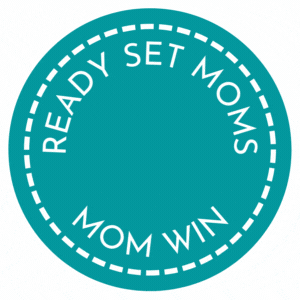Enough Good Sleep Will Make Your Mornings Easier (For You And Your Kids!)
If mornings where you and your kids wake up feeling refreshed, energized and ready to tackle that to-do list are rare, this is the post for you. We’re going to talk about how you can make your mornings easier to set you up for success in the morning and for the rest of your day. Yes, even if you aren’t a morning person!

Enough Good Sleep Will Make Your Mornings Easier
In the world according to me, kids will sleep as long as their bodies need to. Oversleeping is pretty rare, and could be a sign of a physical or mental health concern. (Cue the medical professionals.) But in typical kids, sleep is good for growing bodies.
If it's a struggle to wake your kid up or get them out of bed, one simple reason may be that they're not getting enough sleep. You might be waking them up (or their alarm might be going off) in the middle of a sleep cycle. I'd be grumpy, too.
When it comes to school breaks or vacations, one of the best parts, in my opinion, is not needing to wake up and start punching the clock, driving that train through the well-timed morning rush to get the kids dressed, fed, and out the door before that school bell rings.
These breaks from routine also give us as parents a chance to observe our children’s sleep needs. Because if we know how much sleep their bodies naturally crave, we can do what we can to set them up to get adequate sleep, and we can make our jobs as morning-routine conductors that much easier.

The Role of Sleep Cycles — how much sleep and how good it is
GRAB YOUR FREE PRINTABLE SO YOU CAN MAKE THIS WORK FOR YOU!
![]()
Imagine 3 different early mornings for yourself:
- You wake up naturally, rising to the surface at the end of a sleep cycle and your circadian rhythm (could anything be dreamier?)
- Your alarm clock wakes you up (and you hit the snooze button an extra time or two)
- Your child wakes you up
With each one, what mood do you take into your morning? What are your energy levels like?
Of course if you’re able to wake up naturally, when your body is ready to, you’re going to have a much better, productive morning where you knock out those important tasks.
As published by SleepFoundation.org, “The sleep stages allow the brain to recuperate from the day and support multiple functions.” Good sleep simply makes the next day better.
And I hope parents take the following to heart when they think about how difficult it can be to cope during those sleep-disrupting years: “Sleep stages are important because they allow the brain and body to recuperate and develop. Failure to obtain enough of both deep sleep and REM sleep may explain some of the profound consequences of insufficient sleep on thinking, emotions, and physical health.”
Sounds about right. No wonder it can be such a struggle!
This is why, when I’m helping mom-life coaching clients architect their schedules in a way to get their needs met, I NEVER recommend shorting how much sleep they get. In fact, making sure they get enough sleep is one of the first things we do.

How Much Sleep Do Kids Really Need?
But one important difference is that our kids’ bodies and brains are growing! And sleep is when that happens best. That’s why they need more sleep, but how much varies from age to age and kid to kid.
The American Academy of Sleep Medicine put out a consensus statement recommending the amount of sleep children should get each day “on a regular basis to promote optimal health.” This aligns with guidance from the American Pediatric Association.
- Infants 4 months to 12 months: 12 to 16 hours (including naps)
- Children 1 to 2 years: 11 to 14 hours (including naps)
- Children 3 to 5 years: 10 to 13 hours (including naps)
- Children 6 to 12 years: 9 to 12 hours
- Teenagers 13 to 18 years: 8 to 10 hours
Check out those ranges! Individual results will vary.
Whatever age we’re talking about, from toddler to older kid to teen, the experts report what parents could have come up with on our own: Getting enough sleep is correlated with better health outcomes including “improved attention, behavior, learning, memory, emotional regulation, quality of life, and mental and physical health.”
One Of The Best Perks Of Your Kids Getting Enough Sleep
But they left something off the list that’s impactful on the quality of your mom-life: BETTER MORNINGS!
When my kids get enough sleep, finish a sleep cycle, and wake themselves up in the morning, that means *I’m* free from the role of Chief Nag.
They don’t want to be nagged. I don’t want to nag, I don’t want to BE a nag.
Being able to awaken naturally instead of by an alarm or a nagging parent is … a gift.
So let’s get curious about how much sleep our individual kids’ growing bodies need, then reverse engineer their bedtime.
When your child was a baby you might have kept a sleep log or used an app for that. You might have known their nap needs and awake windows. Let’s bring that kind of scientific curiosity to our kids at the age they are now.
Mom-Win: Determine how much sleep YOUR kid needs (then help them get it)

Here’s a great way (and maybe the best way!) to change things up: a simple sleep log, where you or your child notes the time they put out their light and their wake-up time. Also worth noting is whether they woke up naturally, by an alarm, or by a grown up. Then, do the math!
Now that you know how much sleep your individual child naturally needs on average, you can use that information to work backwards to know what time he or she should be lights out during the school year.
- Start with the time you need to be out there door <minus> how much time the morning steps take <equals> I'm Up! time
- I'm up! time <minus> hours for a good night's sleep <equals> Lights Out time
(People, I know this is obvious stuff. I also know that sometimes having the prompt to think these things through and a structure to do so can be super helpful.)
The most important thing to remember here is to give yourself plenty of time to see what works for you and your family. New habits can be tough to try out and implement, but the health (and happiness!) benefits of a good night’s sleep for you and your family members will be well worth it.
Some Bonus Tips For A Great Night's Sleep & A Great Next Day
- Leave a little time (or a lot of time!) before bed for an evening routine that you enjoy
- Stay away from the light of your phone in the hours before bedtime
- Pick out your outfit or workout clothes for the next morning to eliminate any decision fatigue when you wake up
- When you wake up, open your blinds for some natural light as this will help you wake up
- Make sure you’re not checking your phone or social media first thing!
- Set up a calm, good morning routine for yourself that you look forward to or that sets you up for a productive day
- Drink water when you wake up for a little boost of energy
- Eat a healthy breakfast to sustain your energy throughout the first part of the day
This post was all about making your mornings easier (for parents and kids!). If this meant something to you, you might also like:
Your 4-Step Framework To Make School Mornings More Manageable
7 MORE Strategies for Easier, Calmer School Morning Routines
Daylight Savings Guide For Parents
If this post helps make your mom-life easier,
subscribe to the weekly-ish newsletter and never miss a post.



